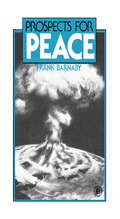- Table View
- List View
Prospects for Peace
by Frank BarnabyProspects for Peace is an eight-chapter text that focuses on the issues and controversies in the so-called global peace.The first chapters provide a framework of the issues of global peace, the increasing probability of nuclear war, global militarization, and the spread and use of nuclear weapons. These topics are followed by discussions of legal policies concerning nuclear weapon, particularly nuclear war fighting weapon in Europe. A chapter examines the unimaginable consequences of nuclear war. The last chapter emphasizes the prospects for peace, including nuclear weapon disarmament and the control of military science.
PROSPER: Major Suttill's French Resistance Network
by Francis J. SuttillIn May 1940 Francis Suttill was commissioned into the East Surrey regiment of the British Army. He was later recruited by the SOE, and after being trained during the summer of 1942, Suttill was chosen to create a new resistance network in northern France, based in Paris, with the operational name Physician. His code name was Prosper and his assumed identity was François Desprées. The circuit of agents grew fast until June 1943, when the Gestapo discovered letters, instructions, crystal sets and addresses in a car and false ID papers in an apartment. Over the next three months, more then eighty agents died or were killed, mostly in concentration camps. Major Suttill DSO would be killed in Sachsenhausen in May 1945. Rumours of betrayal by MI6, even of the involvement of Winston Churchill, have abounded ever since. For the first time, Major Suttill’s son tells the whole story of the tragedy basing his meticulous research on primary sources.
Protecting Critical Infrastructures Against Cyber-Attack (Adelphi series)
by Stephen LukasikThe threat that is posed by "cyber-warriors" is illustrated by recent incidents such as the Year 2000 "Millennium Bug". Strategies to reduce the risk that cyber-attack poses, at both individual and national level, are described and compared with the actions being taken by a number of Western governments.
Protecting Critical Infrastructures Against Cyber-Attack (Adelphi series)
by Stephen LukasikThe threat that is posed by "cyber-warriors" is illustrated by recent incidents such as the Year 2000 "Millennium Bug". Strategies to reduce the risk that cyber-attack poses, at both individual and national level, are described and compared with the actions being taken by a number of Western governments.
Protecting Democracy from Dissent: Population Engineering In Western Europe, 1918-1926 (Routledge Studies in Modern European History)
by Shannon MonaghanIn the aftermath of the First World War, the victorious powers – more or less liberal democracies – argued that democracy would bring peace to Europe because this was the only effective way for legitimate states, with governments based on the consent of the governed, to be organized. What the victorious statesmen failed to foresee was how much conflict this postwar settlement would provoke, since it was far from clear exactly which people should qualify for the privilege of self-governance. It is well known that these conflicts played out dramatically and violently in eastern and southeastern Europe in the immediate postwar years. What is less well known is that the contest extended into the western European heartland of the victorious powers as well. There, the quest for a new conception of democracy – based on both liberalism and nationalism – led the victors to pursue liberal policies of population engineering with, paradoxically, the best of intentions: the preservation and stability of democracy itself. In an era in which people were becoming more involved in choosing their governments, governments were becoming more involved in choosing their people. While the victors sought to craft a more ethical – or at least more legalistic – form of population engineering than the often violent and ad hoc versions employed further east, the result nevertheless remained at odds with the ethical foundations of liberal democracy.
Protecting Democracy from Dissent: Population Engineering in Western Europe 1918-1926 (Routledge Studies in Modern European History)
by Shannon MonaghanIn the aftermath of the First World War, the victorious powers – more or less liberal democracies – argued that democracy would bring peace to Europe because this was the only effective way for legitimate states, with governments based on the consent of the governed, to be organized. What the victorious statesmen failed to foresee was how much conflict this postwar settlement would provoke, since it was far from clear exactly which people should qualify for the privilege of self-governance. It is well known that these conflicts played out dramatically and violently in eastern and southeastern Europe in the immediate postwar years. What is less well known is that the contest extended into the western European heartland of the victorious powers as well. There, the quest for a new conception of democracy – based on both liberalism and nationalism – led the victors to pursue liberal policies of population engineering with, paradoxically, the best of intentions: the preservation and stability of democracy itself. In an era in which people were becoming more involved in choosing their governments, governments were becoming more involved in choosing their people. While the victors sought to craft a more ethical – or at least more legalistic – form of population engineering than the often violent and ad hoc versions employed further east, the result nevertheless remained at odds with the ethical foundations of liberal democracy.
Protecting National Security: A History of British Communications Investigation Regulation
by Phil GloverThis book contends that modern concerns surrounding the UK State’s investigation of communications (and, more recently, data), whether at rest or in transit, are in fact nothing new. It evidences how, whether using common law, the Royal Prerogative, or statutes to provide a lawful basis for a state practice traceable to at least 1324, the underlying policy rationale has always been that first publicly articulated in Cromwell’s initial Postage Act 1657, namely the protection of British ‘national security’, broadly construed. It further illustrates how developments in communications technology led to Executive assumptions of relevant investigatory powers, administered in conditions of relative secrecy. In demonstrating the key role played throughout history by communications service providers, the book also charts how the evolution of the UK Intelligence Community, entry into the ‘UKUSA’ communications intelligence-sharing agreement 1946, and intelligence community advocacy all significantly influenced the era of arguably disingenuous statutory governance of communications investigation between 1984 and 2016. The book illustrates how the 2013 ‘Intelligence Shock’ triggered by publication of Edward Snowden’s unauthorized disclosures impelled a transition from Executive secrecy and statutory disingenuousness to a more consultative, candid Executive and a policy of ‘transparent secrecy’, now reflected in the Investigatory Powers Act 2016. What the book ultimately demonstrates is that this latest comprehensive statute, whilst welcome for its candour, represents only the latest manifestation of the British state’s policy of ensuring protection of national security by granting powers enabling investigative access to communications and data, in transit or at rest, irrespective of location.
Protecting National Security: A History of British Communications Investigation Regulation
by Phil GloverThis book contends that modern concerns surrounding the UK State’s investigation of communications (and, more recently, data), whether at rest or in transit, are in fact nothing new. It evidences how, whether using common law, the Royal Prerogative, or statutes to provide a lawful basis for a state practice traceable to at least 1324, the underlying policy rationale has always been that first publicly articulated in Cromwell’s initial Postage Act 1657, namely the protection of British ‘national security’, broadly construed. It further illustrates how developments in communications technology led to Executive assumptions of relevant investigatory powers, administered in conditions of relative secrecy. In demonstrating the key role played throughout history by communications service providers, the book also charts how the evolution of the UK Intelligence Community, entry into the ‘UKUSA’ communications intelligence-sharing agreement 1946, and intelligence community advocacy all significantly influenced the era of arguably disingenuous statutory governance of communications investigation between 1984 and 2016. The book illustrates how the 2013 ‘Intelligence Shock’ triggered by publication of Edward Snowden’s unauthorized disclosures impelled a transition from Executive secrecy and statutory disingenuousness to a more consultative, candid Executive and a policy of ‘transparent secrecy’, now reflected in the Investigatory Powers Act 2016. What the book ultimately demonstrates is that this latest comprehensive statute, whilst welcome for its candour, represents only the latest manifestation of the British state’s policy of ensuring protection of national security by granting powers enabling investigative access to communications and data, in transit or at rest, irrespective of location.
Protection Against Genocide: Mission Impossible?
by Neal RiemerWithout succumbing to utopian fantasies or realistic pessimism, Riemer and his contributors call for strengthening the key institutions of a global human rights regime, developing an effective policy of prudent prevention of genocide, working out a sagacious strategy of keenly targeted sanctions—political, economic, military, judicial—and adopting a guiding philosophy of just humanitarian intervention. They underscore significant changes in the international system—the end of the Cold War, economic globalization, the communications revolution— that hold open the opportunity for significant, if modest, movement toward strengthening key institutions.The essays explore key problems in working toward prevention of genocide. They highlight the existence of considerable early warning of genocide and emphasize that the real problem is a lack of political will in key global institutions. Sanctions, especially economic sanctions may punish a genocidal regime, but at the expense of innocent civilians. Thus, more clearly targeted sanctions are seen as essential. The argument on behalf of a standing police force to deal with the crime of genocide, as they show, is powerful and controversial: powerful because the need is persuasive, controversial because political realists question its cost and political feasibility. Implementing a philosophy of just humanitarian intervention requires an appreciation of the difficulties of interpreting those principles in difficult concrete situations. A permanent international criminal tribunal to deter and punish genocide, they argue, will put into place a much needed component of a global human rights regime. A thoughtful analysis for scholars and students of international politics and law, and human rights in general.
Protection of Civilians and Individual Accountability: Obligations and Responsibilities of Military Commanders in United Nations Peacekeeping Operations (Routledge Research in the Law of Armed Conflict)
by Lenneke SprikThis book explores the question of whether peacekeeping commanders can be held accountable for a failure to protect the civilian population in the mission area. This requires an assessment of whether peacekeeping commanders have an obligation to act against such serious crimes being committed under domestic and international law. The work uses the cases of the Dutch and Belgian peacekeeping commanders in Srebrenica and Kigali as examples, but it also places the analysis into the context of contemporary peacekeeping operations. It unfolds two main arguments. First, it provides a critical note to the contextual interpretation given to international law in relation to peacekeeping. It is argued that establishing a specific paradigm for peacekeeping operations with clear rules of interpretation and benchmark criteria would benefit peacekeeping and international law by making the contextual interpretation of international law redundant. Second, it is held that alternative options to the existing forms of criminal responsibility for military commanders should be considered, possibly focusing more clearly on failing to fulfil a norm of protection that is specific to peacekeeping and distinct from protective obligations under international human rights law and international humanitarian law.
Protection of Civilians and Individual Accountability: Obligations and Responsibilities of Military Commanders in United Nations Peacekeeping Operations (Routledge Research in the Law of Armed Conflict)
by Lenneke SprikThis book explores the question of whether peacekeeping commanders can be held accountable for a failure to protect the civilian population in the mission area. This requires an assessment of whether peacekeeping commanders have an obligation to act against such serious crimes being committed under domestic and international law. The work uses the cases of the Dutch and Belgian peacekeeping commanders in Srebrenica and Kigali as examples, but it also places the analysis into the context of contemporary peacekeeping operations. It unfolds two main arguments. First, it provides a critical note to the contextual interpretation given to international law in relation to peacekeeping. It is argued that establishing a specific paradigm for peacekeeping operations with clear rules of interpretation and benchmark criteria would benefit peacekeeping and international law by making the contextual interpretation of international law redundant. Second, it is held that alternative options to the existing forms of criminal responsibility for military commanders should be considered, possibly focusing more clearly on failing to fulfil a norm of protection that is specific to peacekeeping and distinct from protective obligations under international human rights law and international humanitarian law.
Protector: The epic new adventure through the battlefields of ancient Greece (Athenian #2)
by Conn IgguldenEXPERIENCE THE EPIC BATTLEFIELDS OF ANCIENT GREECE WITH MASTER STORYTELLER CONN IGGULDEN'Iggulden doesn't just describe the ancient world, he takes you there' 5***** Reader Review'Another masterpiece from Iggulden' 5***** Reader Review'It's like being on the battlefield' 5***** Reader Review'An epic piece of historical fiction, full of political intrigue and vivid action' Robert FabbriTWO LEGENDARY BATTLES.ONE FEARLESS WARRIOR . . .________Themistocles stands as the battle-scarred leader of Athens. Yet he is no nobleman, and is distrusted by many.But those who stand against him cannot argue with two things: his victories as a warrior, and the vast Persian army heading their way . . .And so Themistocles must fight.Fight the invaders. Fight the allies who despise him. Fight for his city. As the Persians draw close, he must prove himself again and again in battle.Because history belongs to the courageous . . .________'Brings war in the ancient world to vivid, gritty and bloody life. I'm blown away. Protector stand alongside the best of Mary Renault - an epic with the learning of the classics' ANTHONY RICHES
Protest and Survive: Underground GI Newspapers during the Vietnam War (Non-ser.)
by James LewesDrawing from more than 120 newspapers, published between 1968 and 1970, this study explores the emergence of an anti-militarist subculture within the U.S. armed services. These activists took the position that individual GIs could best challenge their subordination by working in concert with like-minded servicemen through GI movement organizations whose behaviors and activities were then publicized in these underground newspapers. In examining this movement, Lewes focuses on their treatment of power and authority within the armed forces and how this mirrored the wider and more inclusive relations of power and authority in the United States. He argues that this opposition among servicemen was the primary motivation for the United States to withdraw from Vietnam.This first book length study of GI-published underground newspapers sheds light on the utility of alternative media for movements of social change, and provides information on how these movements are shaped by the environments in which they emerge. Lewes asserts that one cannot understand GI opposition as an extension of the civilian antiwar movement. Instead, it was the product of an embedded environment, whose inhabitants had been drafted or had enlisted to avoid the draft. They came from cities and small towns whose populations were often polarized between those who wholeheartedly supported the war and those who became progressively more critical of the need for Americans to be involved in Vietnam.
Protest, Defiance and Resistance in the Channel Islands: German Occupation, 1940-45
by Gilly Carr Paul Sanders Louise WillmotThe Nazi occupation of Europe of World War Two is acknowledged as a defining juncture and an important identity-building experience throughout contemporary Europe. Resistance is what 'saves' European societies from an otherwise chequered record of collaboration on the part of their economic, political, cultural and religious elites. Opposition took pride of place as a legitimizing device in the post-war order and has since become an indelible part of the collective consciousness.Yet there is one exception to this trend among previously occupied territories: the British Channel Islands. Collective identity construction in the islands still relies on the notion of 'orderly and correct relations' with the Germans, while talk of 'resistance' earns raised eyebrows. The general attitude to the many witnesses of conscience who existed in the islands remains ambiguous.This book conversely and expertly argues that there was in fact resistance against the Germans in the Channel Islands and is the first text to fully explore the complex relationship that existed between the Germans and the people of the only part of the British Isles to experience occupation.
Protest, Defiance and Resistance in the Channel Islands: German Occupation, 1940-45
by Gilly Carr Paul Sanders Louise WillmotThe Nazi occupation of Europe of World War Two is acknowledged as a defining juncture and an important identity-building experience throughout contemporary Europe. Resistance is what 'saves' European societies from an otherwise chequered record of collaboration on the part of their economic, political, cultural and religious elites. Opposition took pride of place as a legitimizing device in the post-war order and has since become an indelible part of the collective consciousness.Yet there is one exception to this trend among previously occupied territories: the British Channel Islands. Collective identity construction in the islands still relies on the notion of 'orderly and correct relations' with the Germans, while talk of 'resistance' earns raised eyebrows. The general attitude to the many witnesses of conscience who existed in the islands remains ambiguous.This book conversely and expertly argues that there was in fact resistance against the Germans in the Channel Islands and is the first text to fully explore the complex relationship that existed between the Germans and the people of the only part of the British Isles to experience occupation.
The Proton Launcher: History and Developments
by Christian Lardier Stefan BarenskyThe Soviet / Russian space program was in the hands of three industrial empires: those of Serguei Korolev, the Soviet von Braun who launched Sputnik-1 and Yuri Gagarin, Vladimir Tchelomei, his main competitor, and Mikhail Yangel, Many launchers and satellites in Ukraine.In 2011, we published a first book on the history of the Soyuz launcher that was developed by Korolev and launched more than 1,800 copies. This time, we tell the story of the Proton, the main competitor of the European launcher Ariane, which was developed by Chelomei and launched more than 400 copies. Finally, the last book of the trilogy will deal with the many developments of Yangel. In the three books, the first part deals with the history of rockets in the USSR / Russia (East) and the second part on the history of their commercialization in the West.
The Proton Launcher: History and Developments
by Christian Lardier Stefan BarenskyThe Soviet / Russian space program was in the hands of three industrial empires: those of Serguei Korolev, the Soviet von Braun who launched Sputnik-1 and Yuri Gagarin, Vladimir Tchelomei, his main competitor, and Mikhail Yangel, Many launchers and satellites in Ukraine.In 2011, we published a first book on the history of the Soyuz launcher that was developed by Korolev and launched more than 1,800 copies. This time, we tell the story of the Proton, the main competitor of the European launcher Ariane, which was developed by Chelomei and launched more than 400 copies. Finally, the last book of the trilogy will deal with the many developments of Yangel. In the three books, the first part deals with the history of rockets in the USSR / Russia (East) and the second part on the history of their commercialization in the West.
Protracted Refugee Situations: Domestic and International Security Implications (Adelphi series #375)
by Gil Loescher James MilnerProtracted refugee populations not only constitute over 70% of the world's refugees but are also a principal source of many of the irregular movements of people around the world today. The long-term presence of refugee populations in much of the developing world has come to be seen by many host states in these regions as a source of insecurity.In response, host governments have enacted policies of containing refugees in isolated and insecure camps, have prevented the arrival of additional refugees and, in extreme cases, have engaged in forcible repatriation. Not surprisingly, these refugee populations are also increasingly perceived as possible sources of insecurity for Western states. Refugee camps are sometimes breeding grounds for international terrorism and rebel movements. These groups often exploit the presence of refugees to engage in activities that destabilise not only host states but also entire regions.
Protracted Refugee Situations: Domestic and International Security Implications (Adelphi series)
by Gil Loescher James MilnerProtracted refugee populations not only constitute over 70% of the world's refugees but are also a principal source of many of the irregular movements of people around the world today. The long-term presence of refugee populations in much of the developing world has come to be seen by many host states in these regions as a source of insecurity.In response, host governments have enacted policies of containing refugees in isolated and insecure camps, have prevented the arrival of additional refugees and, in extreme cases, have engaged in forcible repatriation. Not surprisingly, these refugee populations are also increasingly perceived as possible sources of insecurity for Western states. Refugee camps are sometimes breeding grounds for international terrorism and rebel movements. These groups often exploit the presence of refugees to engage in activities that destabilise not only host states but also entire regions.
The Prow Beast (The Oathsworn Series #4)
by Robert LowThe epic and action packed fourth novel in the Oathsworn series, charting the adventures of Orm and his band of Viking brothers.
Proxy War: The Least Bad Option
by Tyrone L. GrohThe U.S. has indirectly intervened in international conflicts on a relatively large scale for decades. Yet little is known about the immediate usefulness or long-term effectiveness of contemporary proxy warfare. In cases when neither direct involvement nor total disengagement are viable, proxy warfare is often the best option, or, rather, the least bad option. Tyrone L. Groh describes the hazards and undesirable aspects of this strategy, as well as how to deploy it effectively. Proxy War explores the circumstances under which indirect warfare works best, how to evaluate it as a policy option, and the possible risks and rewards. Groh offers a fresh look at this strategy, using uncommon and understudied cases to test the concepts presented. These ten case studies investigate and illustrate the different types and uses of proxy war under varying conditions. What arises is a complete theoretical model of proxy warfare that can be applied to a wide range of situations. Proxy war is here to stay and will likely become more common as players on the international stage increasingly challenge U.S. dominance, making it more important than ever to understand how and when to deploy it.
Proxy War in Yemen (Cass Military Studies)
by Bernd Kaussler Keith A. GrantThis book analyzes the civil war in Yemen and how intervening external actors have shaped the trajectory of the conflict. The work examines the conflict in Yemen as a testing ground for expectations about the autonomy and control of proxies by external patrons and the direct consequences for civilian victimization and duration of war. Like other proxy wars, the international dimensions of the war made the conflict in Yemen subject to the geopolitical interests of intervening powers. The longstanding power rivalry between Saudi Arabia and Iran over Middle East supremacy resulted in a competitive intervention in Yemen, where the initial belligerents of the civil war—the Houthi and the Hadi regime—were used as proxies by Tehran and the Gulf coalition led by Riyadh, respectively. Their intervention ultimately translated into a prolonged and destructive conflict. The often contradictory and self-interested patronage strategies by the coalition’s two central patrons, Saudi Arabia and the United Arab Emirates, undermined their broader goal of containing Iran. However, Iran’s support for the Houthis enabled them to bait and bleed the Gulf coalition. Lastly, in an effort to balance against Iran, the United States underwrote the military campaign of the Gulf states with military hardware and personnel, thereby further prolonging the conflict and humanitarian disaster. This book concludes that intervention by external patrons both protracted the civil war and made it far more destructive for the civilian population. This book will be of much interest to students of proxy wars, Middle Eastern conflict, and security studies in general.
Proxy War in Yemen (Cass Military Studies)
by Bernd Kaussler Keith A. GrantThis book analyzes the civil war in Yemen and how intervening external actors have shaped the trajectory of the conflict. The work examines the conflict in Yemen as a testing ground for expectations about the autonomy and control of proxies by external patrons and the direct consequences for civilian victimization and duration of war. Like other proxy wars, the international dimensions of the war made the conflict in Yemen subject to the geopolitical interests of intervening powers. The longstanding power rivalry between Saudi Arabia and Iran over Middle East supremacy resulted in a competitive intervention in Yemen, where the initial belligerents of the civil war—the Houthi and the Hadi regime—were used as proxies by Tehran and the Gulf coalition led by Riyadh, respectively. Their intervention ultimately translated into a prolonged and destructive conflict. The often contradictory and self-interested patronage strategies by the coalition’s two central patrons, Saudi Arabia and the United Arab Emirates, undermined their broader goal of containing Iran. However, Iran’s support for the Houthis enabled them to bait and bleed the Gulf coalition. Lastly, in an effort to balance against Iran, the United States underwrote the military campaign of the Gulf states with military hardware and personnel, thereby further prolonging the conflict and humanitarian disaster. This book concludes that intervention by external patrons both protracted the civil war and made it far more destructive for the civilian population. This book will be of much interest to students of proxy wars, Middle Eastern conflict, and security studies in general.
















